Pickford's win for
Best Actress caused enough whispering and malicious gossip among Academy
members, to institute a change to the voting rules. For the next
five years, voting on nominations and on the ultimate winner, would be
determined by the entire Academy membership.
The next year saw a
win for another Hollywood bright light, Norma Shearer. Shearer beat out
second time nominee, Ruth Chatteron, Gloria Swanson, and Greta Garbo,
amidst rumors that her studio, MGM, had sent out memos to its stable of
stars to vote in her favor.
 .
.
Like Pickford, Montreal born Norma
Shearer was a silent film star. Her transition to talking pictures
seemed to go a little bit smoother, perhaps because she hadn't built up
the reputation that Pickford had in silent pictures, and maybe, and not
hindered by the fact that her husband, Irving Thalberg, was one of the
most successful film producers of the day.
The Divorcee was Shearer's fourth
talkie, and it was a hit with audiences and critics, alike. A 1930
article in Liberty Magazine said, "The acting throughout is fine, and
although Norma Shearer is not so beautiful here as she usually is, she
gives more to the part of Jerry than she has ever given to a
characterization before." Photoplay captured the spirit of the
times with "You won't forget this picture and you'll undoubtedly go
home and have a good long talk with your spouse. But more important,
you'll be amused and held spellbound until the last reel. Don't miss
it."
Despite good reviews, and great
success, Shearer's performance was overshadowed that year by another
silent star, who was making her first talking picture. Amidst
headlines that read, Garbo
Talks! Greta Garbo
appeared in the critical and box office smash, Anna Christie.
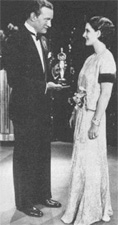 Shearer's
triumph was marred by gossip, including a campaign of coercion by MGM,
which was never proven. Part of the criticism for Shearer's win may
have been over the fact that she was nominated that year for
two
performances. The other film, Their Own Desire, was light weight
fare that even Shearer, herself, was openly critical of.
Shearer's
triumph was marred by gossip, including a campaign of coercion by MGM,
which was never proven. Part of the criticism for Shearer's win may
have been over the fact that she was nominated that year for
two
performances. The other film, Their Own Desire, was light weight
fare that even Shearer, herself, was openly critical of.
Joan Crawford's famous line "What do
you expect? She sleeps with the boss," seemed to be the
last word on the subject. Shearer never responded to the criticism,
maintaining a graciousness throughout her career, that became her
trademark.
Meanwhile, the Academy was under
continued scrutiny, that came to a boil in 1934 when Bette Davis failed to
garner a nomination for Of Human Bondage. Frank Capra quickly
reinstituted the old system, whereby a committee would determine the final
nominees in each category.
Mary Pickford faded from view
shortly after her Best Actress win. She did a couple of other films,
including Taming of the Shrew, which proved her ability to hold her own in
the talkies. Soon after, however, she left acting, appearing
publicly, only on rare occasions. Fearing that people would
laugh at her work, Pickford bought out the rights to most of her films and
refused any distribution of them. She hid behind the gates of
Pickfair, living out the remainder of her life with regret over her fading
image. In 1975, the Academy saw fit to honor her with a lifetime achievement
award. The sight of the aged star, accepting from her home, brought
many in the audience to tears.
Meanwhile, for Shearer, she
managed to prove that her success was no fluke, and that she was more than
just Irving Thalberg's pretty wife. She held her own in prestige
pictures that he produced, garnering another four nominations.
Thalberg died suddenly in 1936, and while the tragedy was devastating for
Shearer, she continued to work on popular pictures, including Marie
Antoinette, and The Women (with Joan Crawford).
Shearer retired from acting in the
early forties, and while spotted by the paparazzi occasionally throughout
the years, she, like Pickford, never returned to acting.
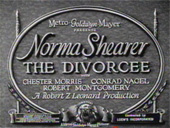
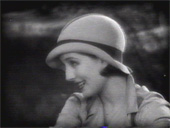

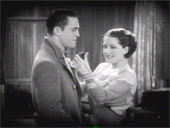

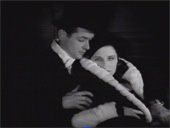
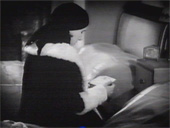
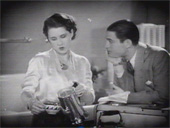
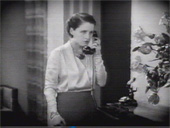
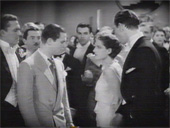
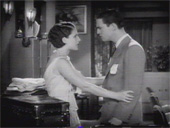
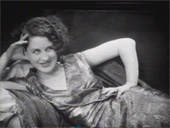
 .
.
 Shearer's
triumph was marred by gossip, including a campaign of coercion by MGM,
which was never proven. Part of the criticism for Shearer's win may
have been over the fact that she was
Shearer's
triumph was marred by gossip, including a campaign of coercion by MGM,
which was never proven. Part of the criticism for Shearer's win may
have been over the fact that she was 


